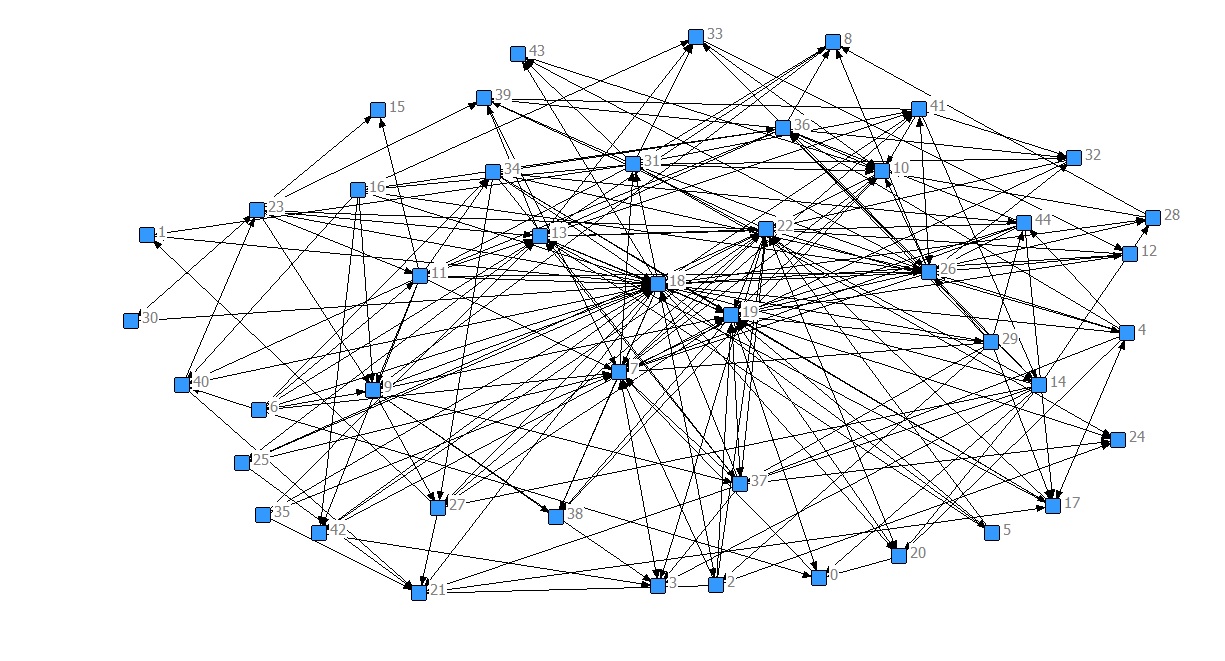 PDF(703 KB)
PDF(703 KB)


 PDF(703 KB)
PDF(703 KB)
 PDF(703 KB)
PDF(703 KB)
基于社会网络分析的虚拟学术社区知识共享研究
Research on Knowledge Sharing in Virtual Academic Community Based on Social Network Analysis
[目的/意义] 虚拟学术社区的兴起为科研工作者们进行合作交流、参与同行评议、分享自己研究成果提供了新渠道。面对Science 2.0环境下海量学术信息的分散性、碎片性和时效性,如何推动科研工作者利用虚拟学术社区进行快速、高效的知识共享成为大数据时代的重要课题。[方法/过程] 以科学网为例,运用社会网络分析法挖掘虚拟学术社区中的意见领袖,通过计算中心度和影响力系数等指标,指出意见领袖在知识共享中起到的重要作用,据此设计虚拟学术社区成员关系模型,并进一步分析影响知识共享的主要因素。[结果/结论] 构建了虚拟学术社区知识共享路径,实现了线上和线下协同发展,提高了知识的耦合性和重用性,进而推动科研创新。
[Purpose/significance] The rise of virtual academic community provides a new channel for researchers to cooperate and exchange, participate in peer review, and share their research results. Faced with the dispersion, fragmentation and timeliness of the vast amount of academic information in science 2.0 environment, how to promote the rapid and efficient knowledge sharing among researchers with virtual academic community has become an important issue in the era of big data. [Method/process] This paper took the scientific network as an example, used the social network analysis method to dig the opinion leader in the virtual academic community, and pointed out the opinion leader plays an important role in the knowledge sharing by calculating the centrality and influence coefficient and so on. Finally, it designed the virtual academic community member relation model, and further analyzed the main factors that affect the knowledge sharing. [Result/conclusion] It constructed the knowledge sharing path of virtual academic community, realized the collaborative development of online and offline, improved the coupling and reuse of knowledge, and promote scientific innovation.

virtual academic community / social network analysis / knowledge sharing
| [1] |
KOH J, KIM Y G. Knowledge sharing in virtual communities: an e-business perspective [J]. Expert systems with applications,2004,26(2):155-166.
|
| [2] |
张帅,李晶,王文韬.学术社交网站用户社交不足的影响机理:基于质性方法的探索[J].图书情报工作,2018,62(4):81-87.
|
| [3] |
黄家良,谷斌.基于大数据的虚拟社区知识共享模式及体系架构研究[J].情报理论与实践,2016(2):93-96.
|
| [4] |
黄维,赵鹏.虚拟社区用户知识共享行为影响因素研究[J].情报科学,2016(4):68-73.
|
| [5] |
王鹏,艾时钟.基于生命周期的虚拟社区知识共享博弈分析[J].中国管理科学,2016(1):74-80.
|
| [6] |
杨陈,唐明凤,花冰倩.关系型虚拟社区知识共享行为的影响机制——自我建构视角[J].图书馆论坛,2017(4):68-76.
|
| [7] |
张敏,唐国庆,张艳. 基于S-O-R范式的虚拟社区用户知识共享行为影响因素分析[J].情报科学,2017(11):149-155.
|
| [8] |
耿瑞利,申静.社交网络用户知识共享研究:特征、内容与展望[J].图书情报知识,2018(1):16-26.
|
| [9] |
王东,刘国亮.虚拟学术社区及其知识共享实现机制研究框架[J].科技进步与对策,2012(5):138-141.
|
| [10] |
王东,刘国亮.虚拟学术社区知识共享的实现路径与策略研究[J].情报理论与实践,2013(6):41-44.
|
| [11] |
张敏,郑伟伟,石光莲.虚拟学术社区知识共享主体博弈分析——基于信任的视角[J].情报科学,2016(2):55-58.
|
| [12] |
邱均平,王菲菲.基于SNA的国内竞争情报领域作者合作关系研究[J].图书馆论坛,2010,20(6):34-40,134.
|
| [13] |
李卓卓,丁子涵.基于社会网络分析的网络舆论领袖发掘——以大学生就业舆情为例[J].情报杂志,2011,30(11):67-70.
|
| [14] |
LIN F R, LIN S C, HUANG T P. Knowledge sharing and creation in a teachers’ professional virtual community [J]. Computers & education,2010,54(2):309.
|
| [15] |
毛波,尤雯雯. 虚拟社区主体分类模型[J].清华大学学报(自然科学版),2006(S1):1069-1073.
|
| [16] |
JIANG J P, NI C Q, HE D Q, et al. Mendeley group as a new source of interdisciplinary study: how do disciplines interact on Mendeley? [C]// Proceedings of the 13th ACM/IEEE-CS joint conference on digital libraries. New York: ACM Press,2013:135-138.
|
| [17] |
邱均平,熊尊妍.基于学术BBS的信息交流研究——以北大中文论坛的汉语言文学版为例[J].图书馆工作与研究,2008(8):3-8.
|
| [18] |
CHEN C J, HUNG S W. To give or to receive-factors influencing members knowledge sharing and community promotion in professional virtual communities [J]. Information & management,2010,47(4):226-236.
|
| [19] |
邵波.基于社会网络的知识共享创新与共享模型构建分析[J].情报杂志,2011(2):23-26.
|
| [20] |
罗洪云,林向义,朱志红.虚拟科研团队知识共享机制研究[J].现代情报,2013(4):12-16.
|
祁凯: 负责整体论文结构架构及撰写;
张子墨: 负责案例选取及社会网络分析应用。
/
| 〈 |
|
〉 |